
The oral modified dysfunctional tyrosine SM-88 has demonstrated antitumor activity and appears to broadly effect the immune dynamics of the tumor microenvironment, according to early data from 2 xenograft studies.

Your AI-Trained Oncology Knowledge Connection!


The oral modified dysfunctional tyrosine SM-88 has demonstrated antitumor activity and appears to broadly effect the immune dynamics of the tumor microenvironment, according to early data from 2 xenograft studies.

Plasma-based next-generation sequencing continues to offer a minimally invasive, highly specific modality to identify patients with actionable alterations in non–small cell lung cancer.

Circulating tumor DNA clearance of EGFR mutation may be predictive of prolonged progression-free survival for patients with EGFR-mutant, MET-amplified non–small cell lung cancer with detectable ctDNA at baseline.

KRAS mutations are found in approximately in 25% of all NSCLC, and it was not until recently that the previously coined “undruggable target” showed signals of actionability with KRAS mutation–specific therapy, tumor-suppressor–specific therapy, and anti-inflammatory therapy.

Timothy Cragin Wang, MD, discusses the lack of response to checkpoint inhibitors in colorectal cancer.

The FDA is presently spearheading several initiatives in light of COVID-19 aimed at refining the role of RWD in cancer care to guide clinical trial development, procure answers to pressing clinical questions, and support regulatory decisions for in vitro diagnostics.

In urothelial carcinoma models, enfortumab vedotin-ejfv appeared to promote multiple mechanisms of action such as bystander cell killing, supporting the use of the agent either alone or in combination with pembrolizumab.
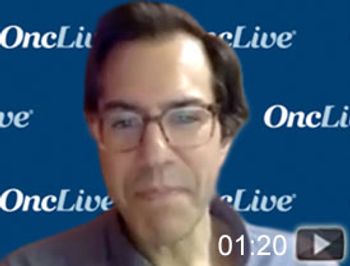
Matthew Galsky, MD, discusses sequencing questions in urothelial carcinoma.
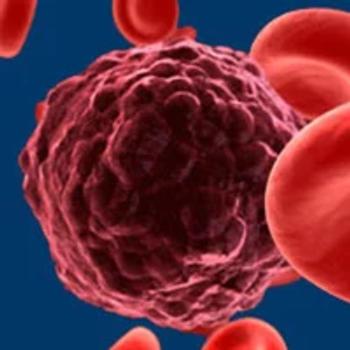
In preclinical models, the novel irreversible BTK inhibitor TG-1701 demonstrated similar activity to ibrutinib in mantle cell lymphoma cell lines and showed additive benefit when combined with ublituximab and umbralisib in non-Hodgkin lymphoma model.

Neal D. Shore, MD, FACS, discusses immunotherapy targeting prostate-specific antigen (PSA) and prostate-specific membrane antigen (PSMA) in biochemically recurrent prostate cancer.

The combination of atezolizumab plus carboplatin/etoposide continued to demonstrate an improvement in overall survival versus chemotherapy alone as a frontline treatment for patients with extensive-stage small cell lung cancer.

Tucatinib was found to be a potent inhibitor of HER2-mutant signaling in vitro.

Robert Rintoul, BSc, MB ChB, PhD, FRCP, discusses the importance of minimal residual disease assessment in patients with non–small cell lung cancer.

Three main survivin isoforms demonstrated the ability to translocate to the surface of plasma membrane in multiple cell types, suggesting a targetable role as a molecular biomarker.
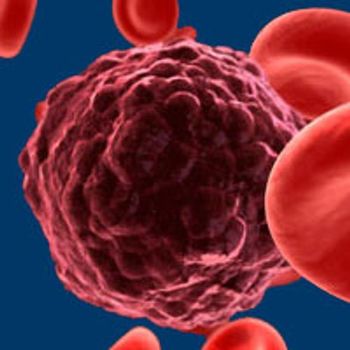
Significant differences were seen between Hispanic and non-Hispanic white patients with hematological malignancies in Texas in terms of the age of diagnosis and long-term survival outcomes.

The use of adjuvant immunotherapy in patients with resected stage IIIC melanoma resulted in improved survival benefit, according to real-world data from an early analysis of the National Cancer Database.

Patients 18 to 39 years of age with early-onset cancer had a significantly high risk of harboring germline mutations, suggesting that this population should undergo germline genetic testing, irrespective of tumor type.

The addition of the individualized neoantigen specific immunotherapy RO7198457 to atezolizumab induced neoantigen-specific T-cell responses, and was found to be well tolerated in patients with advanced solid malignancies.

Findings from an observational study of more than 10,000 women with ovarian cancer showed that lipophilic statins were associated with a 43% overall reduction in epithelial ovarian cancer mortality, with declines seen across subtypes.

The triplet therapy of isatuximab-irfc, carfilzomib, and dexamethasone showed a statistically significant improvement in PFS versus carfilzomib and dexamethasone alone in patients with relapsed/refractory multiple myeloma.
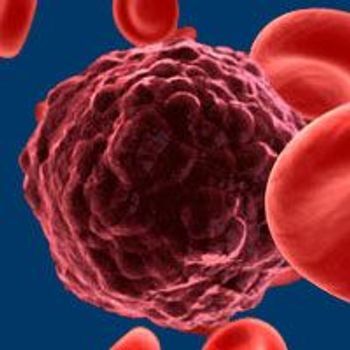
Results from a survey of patients in the United Kingdom showed patients with sickle cell disease diagnosed with COVID-19 and who had mild symptoms were more likely to die or require mechanical ventilation than those with more severe symptoms of COVID-19.

Endotheliopathy represents a marker of progression to critical illness in patients with COVID-19 infection and soluble thrombomodulin segregates with mortality.
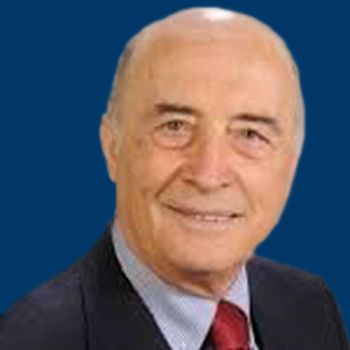
More patients with low-risk polycythemia vera treated with ropeginterferon alfa-2b were able to maintain hematocrit levels at or below 45% compared with those who received monthly phlebotomy alone.

Meletios A. Dimopoulos, MD, discusses safety results from the randomized phase 3 ASPEN trial of zanubrutinib (Brukinsa) in patients with Waldenström macroglobulinemia.
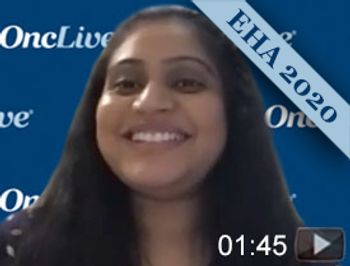
Chetasi Talati, MD, discusses the ongoing safety analysis of venetoclax (Venclexta)-based combinations in patients with newly diagnosed acute myeloid leukemia.

The combination of eprenetapopt and azacitidine led to high objective response rates and complete response rates in patients with TP53-mutated myelodysplastic syndrome and acute myeloid leukemia.

Data from the BELIEVE trial showed that luspatercept-aamt, a first-in-class erythroid maturation agent designed to regulate late-stage red blood cell maturation, reduced the need for red blood cell transfusions across every subgroup of patients with beta-thalassemia.

Interim results from a phase 1 trial show CC-93269 has activity in highly refractory, heavily pretreated patients with multiple myeloma, with an acceptable safety profile.

Thomas Cluzeau, MD, PhD, discusses the response rates of a phase 2 study with APR-246 and azacitidine in TP53-mutated myelodysplastic syndromes and acute myeloid leukemia.
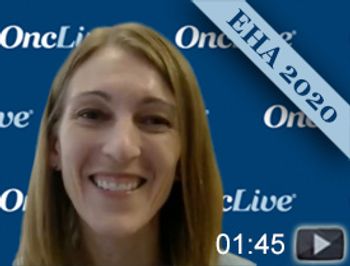
Courtney DiNardo, MD, MSCE, discusses the results of the phase 3 VIALE-A trial in acute myeloid leukemia (AML).